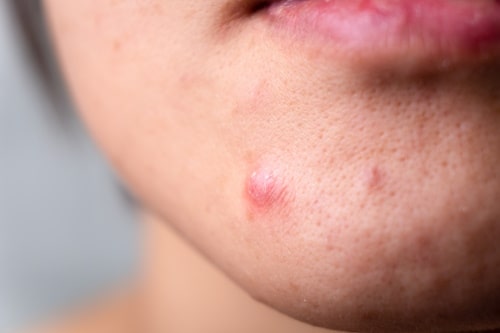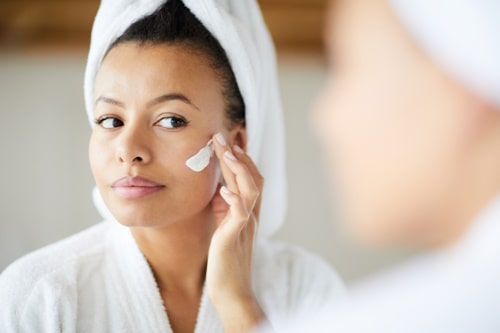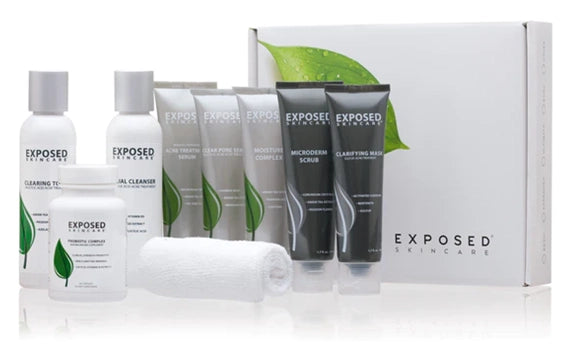Acne is a common skin condition, but it can become a more severe and challenging issue when it becomes cystic acne. Mild cystic acne, characterized by deep, inflamed, and painful cysts underneath the skin, requires a targeted approach to treatment.
This blog post will explore the five best treatments for mild cystic acne, providing a comprehensive guide to effectively managing and reducing these persistent breakouts.
Also read: How to choose the best acne treatment
Biggest Take-Aways:
- Cystic acne is a severe form of acne requiring a comprehensive treatment approach.
- Over-the-counter products with specific ingredients can effectively treat mild to moderate cystic acne.
- Consistent skincare routines and lifestyle adjustments are crucial in managing and preventing cystic acne.
- Exposed Skin Care offers a balanced approach to acne treatment, combining scientific and natural elements to manage and prevent acne effectively.

Understanding Mild Cystic Acne: A Brief Overview
Before diving into the treatments, it's crucial to understand what mild cystic acne is. This type of acne is a severe acne marked by deep, painful cysts under the skin.
These cysts form when pores clog with oil and dead skin cells, leading to inflammation and often painful pimples. While acne is a common concern, cystic acne is more severe and can cause scarring if not treated properly.
1. Over-The-Counter Products: A First Line of Defense
Over-the-counter (OTC) products are often the first step in a mild cystic acne treatment plan. These products are readily available and can be effective in managing mild cases.
- Salicylic Acid: This beta-hydroxy acid is known for its ability to exfoliate the skin and unclog pores. Salicylic acid products can help prevent clogged pores and reduce breakouts.
- Benzoyl Peroxide: An effective ingredient for treating various types of acne, including cystic acne. It kills bacteria that cause acne and helps dry out existing pimples.
- Adapalene: A type of topical retinoid, adapalene can help treat acne by regulating skin cell turnover and reducing inflammation. It's available over the counter in various forms, including gels and creams.
2. Topical Retinoids: A Step Up in Treatment
Topical retinoids are a cornerstone in acne treatment. They work by increasing skin cell turnover, which prevents the formation of new acne cysts and helps treat existing ones.
- Retinoid Creams and Gels: Products containing retinoids, such as adapalene, can be highly effective for mild cystic acne treatment. They help reduce inflammation and prevent new acne formation by keeping pores clear.

- Consistent Application: It's important to use these products consistently as part of your acne skin-care routine to see results.
3. Targeted Spot Treatments: Addressing Individual Cysts
Sometimes, treating individual cysts can be more effective. Spot treatments are designed to be applied directly to the cystic pimple.
- Spot Treatment Gels: These products often contain concentrated acne-fighting ingredients like benzoyl peroxide or salicylic acid.
- Timely Application: Applying these treatments as soon as you notice a cystic pimple can help reduce size and prevent scarring.
4. Lifestyle Changes and Home Remedies: Supporting Your Skin
Lifestyle changes and home remedies can also be crucial in managing mild cystic acne.
- Regular Cleansing: Gently wash your face twice daily with a mild cleanser to remove excess oil and dead skin cells that can clog pores.
- Balanced Diet: Eating a balanced diet and staying hydrated can support skin health and reduce breakouts.
- Stress Management: Since stress can trigger or worsen acne, incorporating stress-relief practices like yoga or meditation can be beneficial.
5. Hormonal Considerations: Understanding the Role of Hormones
Hormones can play a significant role in the development of cystic acne, especially in women.
- Menstrual Cycle: Women might notice increased cystic acne breakouts during certain phases of their menstrual cycle due to hormonal fluctuations.

- Hormonal Treatments: In some cases, treatments that target hormonal imbalances, like spironolactone, can effectively manage acne. These treatments help regulate hormone levels and reduce the likelihood of hormone-induced breakouts.
Inflammation Reduction: A Key Aspect of Treatment
Reducing inflammation is vital in treating cystic acne. Many treatments, including over-the-counter products and topical retinoids, have anti-inflammatory properties. By reducing inflammation, these treatments help lessen the redness and swelling associated with cystic acne cysts, leading to a clearer complexion.
The Importance of Consistency and Patience
Treating mild cystic acne requires consistency and patience. Acne treatments, especially those targeting cystic acne, can take several weeks to show results. Sticking to your treatment plan and giving your skin the time it needs to heal is important.
Personalizing Your Treatment Approach
Every individual's skin is unique, and what works for one person may not work for another. Finding a treatment plan that suits your specific skin type and acne severity is essential. Over time, you may need to adjust your approach based on how your skin responds to different treatments.
Preventing Future Breakouts
In addition to treating existing acne, preventing future breakouts is important. This can be achieved through regular skin care, maintaining a healthy lifestyle, and being mindful of factors that may trigger acne.
The Benefits of Exposed Skin Care in Managing Acne
Exposed Skin Care has emerged as a popular and effective treatment for various forms of acne, including the inflammatory types that cause cystic acne.
Here's why it stands out:
-
Comprehensive Approach: Exposed Skin Care targets multiple factors that cause acne. It addresses excess oil production by the glands, helps remove dead skin cells that clog pores leading to black and whiteheads and reduces inflammation.
-
Combining Science and Nature: This unique system blends scientific ingredients like benzoyl peroxide with natural extracts. This synergy helps in treating acne while minimizing potential skin irritation.
-
Reducing Reliance on Oral Antibiotics: For many, long-term use of oral antibiotics can be concerning due to potential side effects. Exposed Skin Care offers an alternative that can reduce or eliminate the need for these antibiotics.
-
Targets Inflammatory Acne: Since cystic acne is an inflammatory type, the anti-inflammatory properties of Exposed Skin Care are particularly beneficial. It helps reduce the redness and swelling associated with acne cysts.
-
Alternatives to Isotretinoin: For those seeking alternatives to strong medications like isotretinoin, Exposed Skin Care offers a less aggressive option. It can be especially useful for those whose acne tends to be persistent but not severe enough to require isotretinoin.
Overall, Exposed Skin Care provides a balanced, effective treatment method for managing acne, especially for those looking to treat acne without relying heavily on antibiotics.
Conclusion
Understanding and managing cystic acne, a serious type of acne, requires a multifaceted approach. According to dermatologists, this severe form of acne, which often leads to painful nodular acne and cystic pimples, demands targeted treatment options.
Treating cystic acne involves navigating through various acne causes, from hormone fluctuations to inflammatory processes. Effective treatment plans for cystic acne emphasize the importance of using the right acne medications and skincare products.
Over-the-counter treatments have proven beneficial. These products help reduce the redness and inflammation typical of this acne type, reducing the risk of scarring.
For those struggling with severe acne, especially cystic acne, Exposed Skin Care offers a balanced approach. It addresses the root causes of acne and helps prevent new breakouts, crucial in managing acne and reducing its appearance.
Finally, it's essential to recognize that untreated cystic acne can cause significant emotional and physical distress. Early and effective intervention not only helps treat cystic acne but also prevents the development of acne scarring, ensuring healthier skin in the long term.
Remember, the key to successful acne management lies in finding the right combination of treatments and being consistent with your skincare routine.
FAQs
What Causes Cystic Acne?
Cystic acne is caused by a combination of factors, including hormonal fluctuations, overproduction of oil, and buildup of dead skin cells in pores, leading to severe inflammation.
Can Over-The-Counter Products Effectively Treat Cystic Acne?
Yes, certain over-the-counter products containing ingredients like benzoyl peroxide, salicylic acid, and adapalene can effectively treat mild to moderate cystic acne.
Are Prescription Medications Necessary for Treating Severe Cystic Acne?
In cases of severe cystic acne, prescription medications may be necessary, especially when over-the-counter treatments are not effective.
Can Lifestyle Changes Help with Cystic Acne?
Yes, lifestyle changes such as maintaining a healthy diet, reducing stress, and proper skin hygiene can help manage and prevent cystic acne.
How Does Exposed Skin Care Help in Managing Acne?
Exposed Skin Care combines scientific and natural ingredients to target multiple acne causes, helping to reduce inflammation, unclog pores, and prevent future breakouts.
















